|
| Can't view this email? Please click here to view the online version. |
|
 |
|
|
|
|
|
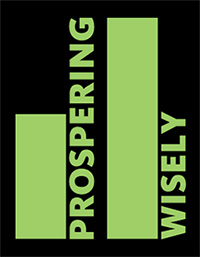 What does prosperity really mean?
What does prosperity really mean?
A new British Academy initiative that aims to kick-start a national conversation about the place of humanities and social science research in our society was launched in February with a publication, a website and a series of events. Prospering Wisely argues that we need to think about the nature of prosperity in much broader terms than its usual, purely financial definition. Drawing on expert views from influential academics such as Nicholas Stern, Mary Beard and Peter Hennessy, it explores how prosperity depends on the many ways the humanities and social sciences enhance our lives, as individuals and as a society.
Illustrating the argument at the heart of Prospering Wisely are a series of video interviews with eleven leading academics whose research has been highly influential in a variety of fields. Longer interviews with each have been simultaneously published in a special issue of the British Academy Review. A recording of the public panel discussion chaired by Melvyn Bragg which launched the initiative on 12 February is also now available on the Academy's website. |
|
|

|
|
|
|
|
|
|
|
|
British Academy debates put ageing under the spotlight
|
|
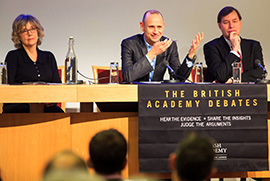 Following the launch of Prospering Wisely, the British Academy is holding a series of debates in different centres around the UK, starting with an exploration of the challenges and opportunities of a steadily ageing population. The first debate took place on 26 February in London, chaired by Evan Davis, and subsequent debates are scheduled for Sheffield on 25 March and Edinburgh on 29 April.
Following the launch of Prospering Wisely, the British Academy is holding a series of debates in different centres around the UK, starting with an exploration of the challenges and opportunities of a steadily ageing population. The first debate took place on 26 February in London, chaired by Evan Davis, and subsequent debates are scheduled for Sheffield on 25 March and Edinburgh on 29 April.
The British Academy Debates will look in turn at one of today's toughest social challenges (Immigration and Well-Being will follow Ageing) and illuminate the crucial issues involved, with the aim of helping individuals, communities and politicians make better informed decisions in key areas that affect their lives. |
|
 |
|
|
|
|
|
Scotland – Enlightening the constitutional debate
|
|
|
Ahead of this autumn's Scottish independence referendum, the British Academy and the Royal Society of Edinburgh have joined forces to create a year-long series of events in which leading academics seek to provide enlightenment on the central issues involved. A video recording of the final public discussion, United Kingdom(s)? Scotland's Referendum and Britain's Future, hosted by the BBC's Sally Magnusson on 6 March, is now available on the Academy's website. The final event in the series will be held in Edinburgh on 8 April, and will launch a report which summarises all the discussions that have taken place throughout the series. |
|
 |
|
|
|
|
|
| Academy President Lord Stern leads delegation to Beijing |
|
| British Academy President Lord Stern is leading an Academy delegation taking part in a joint high-level workshop in Beijing focusing on international economic policy and governance issues. This joint event, in late March, follows the signing of a new Memorandum of Understanding by the two Academies in October 2012.
|
|
 |
|
|
|
|
|
|
|
|
|
Proposals published that could help reduce UK health inequalities
|
|
|
A collection of opinion pieces from leading social scientists has been published by the British Academy. The report seeks to help local policymakers improve the health of their communities – by each identifying one policy intervention they think could help reduce health inequalities. 'If you could do one thing – Nine local actions to reduce health inequalities' has had a very enthusiastic reception from the public health community and local authorities and has been presented and discussed at conferences organised by Public Health England, the Local Government Association, NHS Employers and the NHS Confederation. As well as being covered in national and international press, it was also praised in the House of Commons by the public health minister, Jane Ellison MP. |
|
 |
|
|
|
|
| Report reveals why UK must invest in soft power |
|
| A new British Academy report has urged the UK government not to neglect the vital importance of soft power in global relations, and why it is essential to invest in long-term assets such as cultural institutions and universities. The Art of Attraction: Soft Power and the UK's Role in the World, authored by Christopher Hill FBA and Sarah Beadle, discusses the nature and relevance of soft power, looks at the UK's soft power resources and its ability to mobilise them, examines the main dilemmas, and includes a series of recommendations for policy makers and wider society. |
|
 |
|
|
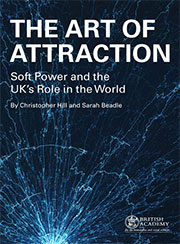 |
|
|
|
|
|
Exploring our cultural heritage that lies underwater
|
|
|
The British Academy and the Honor Frost Foundation have together called on the government to do more to protect the UK's rich maritime legacy by ratifying the 2001 UNESCO Convention of the Protection of the Underwater Cultural Heritage. A steering group of senior archaeologists and underwater cultural heritage experts, brought together by the two bodies, warns that – without ratification – the UK is largely incapable of offering protection to UK wrecks lying beyond our own waters – with the centenary of the First World War offering ample reminder of how many remains of British ships and seafarers still rest there. |
|
 |
|
|
|
|
|
Lost for Words?
|
|
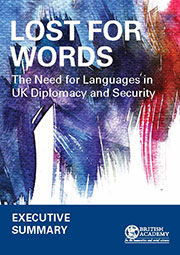 |
|
The British Academy has published a major policy report, Lost for Words: the need for languages in UK diplomacy and security, which summarises the Academy's inquiry into the UK's current and future needs for foreign language skills in the fields of security and diplomacy.
Launching the report at an event in the Houses of Parliament, the Chair of the Foreign Affairs Select Committee, the Rt Hon Richard Ottaway MP, said: "The consequences of being lost in translation in international affairs are all too often very real and can be tragic. I therefore welcome the British Academy report. It raises many interesting points, in particular the potential of the UK's native or heritage non-English speakers for UK diplomacy; the need for a cross-government approach; and that the language problem is not just a problem for the government – it needs to be tackled all the way from schools and universities across to business too."
|
|
 |
|
|
|
|
|
| Workshop scheme for early career researchers is piloted |
|
| A series of Early Career Research Networking Events are to take place across the UK over the coming months in response to a British Academy initiative to encourage networking workshops for early career scholars. Following a call to current and former British Academy Postdoctoral Fellows, 33 events have been sponsored so far, taking place in 20 regional locations around the country between March and September 2014. Each event features a Fellow of the Academy as its champion.
|
|
 |
|
|
| April Deadline for Small Research Grants |
|
| British Academy/Leverhulme Small Research Grants offer one of our most popular research funding opportunities. They are designed to be flexible and can be used for a variety of research funding needs. Grants can be used for research anywhere in the world, for individual needs or small-scale collaborative projects. Awards are often used as first grant opportunities by early career researchers, or for pilot studies when planning a major piece of research. Awards are available up to £10,000. The next deadline is 16 April.
|
|
 |
|
|
|
|
|
|
|
|
Newton international fellows arrive in the UK
|
|
|
The sixth cohort of British Academy Newton International Fellows arrived in the UK in January to take up their fellowships. 12 early career post-doctoral researchers from a range of different countries will be carrying out two years of humanities or social science research in leading UK universities on topics ranging from diplomatic protection as a distinctive source of human rights protection to the relationship between religious and spatial politics in contemporary Japan. |
|
 |
|
|
|
|
|
|
| China and India – Pathways of Economic and Social Development |
|
| A book launch will be held on 16 April 2014 to mark the Academy's publication of 'China and India: Pathways of Economic and Social Development'. The volume, edited by Professor Barbara Harris-White (Oxford University) and Professor Delia Davin (University of Leeds), compares the different paths of economic development in China and India in recent years, and examines their social consequences. The themes addressed in the book relate to the domestic and international economy, labour regimes, the environment, migration and demographic change. |
|
 |
|
|
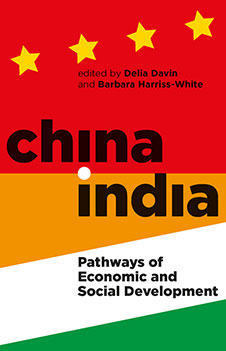 |
|
|
|
|
|
100 years on, final part of Latin Dictionary is finished
|
|
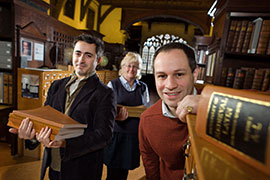 In December 2013 the British Academy published the final part of its monumental Dictionary of Medieval Latin from British Sources. The Dictionary, with more than 58,000 entries in nearly 4,000 pages, is the most comprehensive study ever produced of the vocabulary of Latin in the medieval period in Britain. Begun in 1913, the finished dictionary is the culmination of a century-long enterprise which has had over 200 researchers working on it over the decades.
In December 2013 the British Academy published the final part of its monumental Dictionary of Medieval Latin from British Sources. The Dictionary, with more than 58,000 entries in nearly 4,000 pages, is the most comprehensive study ever produced of the vocabulary of Latin in the medieval period in Britain. Begun in 1913, the finished dictionary is the culmination of a century-long enterprise which has had over 200 researchers working on it over the decades.
The completion of the Dictionary of Medieval Latin from British Sources was marked by a conference attended by editors from the international dictionaries of Medieval Latin, a narrated display of the century-long project in the Bodleian Library, Oxford and covered in national and international press, including BBC Breakfast news.
The Dictionary of Medieval Latin from British Sources has, 58,000 word entries containing over 90,000 senses and just over 436,000 quotations, quotations are drawn from more than 1,400 works by over 500 authors whose names are known, together with thousands of documents written by authors whose names are not recorded, more than 30,000 cross-references, 3830 pages across 17 parts and 3 Editors have led the project over 46 years of drafting (1967–2013). |
|
 |
|
|
|
|
|
|
|
| A full list of recent publications can be found here. |
|
|
|
|
|
|
|
|
|
 |
|
The Best Years of our Lives? Body, Brain and Well–Being |
|
 |
|
| 6pm – 7.30 pm |
|
| Chaired by Simon Callow, the last of three British Academy Debates on Ageing takes place in Edinburgh and asks what are the true consequences of an ageing brain and body? Is it time to rethink what we perceive an older person is capable of? And should policy makers, politicians and business leaders rethink issues such as retirement, flexible working and the way neighbourhoods are designed, to give us longer, fuller lives?
|
|
 |
|
 |
|
Fiction as Therapy: Towards a Neo-Phenomenological Theory of the Novel |
|
| 6 – 7.15pm |
|
| Professor Patricia Waugh (University of Durham) gives the first British Academy lecture on the Novel in English, discussing the way that novels are prime locations for playing with the boundaries of the real, the delusory and the fantastic and that, of all artistic genres, it is the novel that has most grappled with this legacy of modern thought. The Lecture is chaired by Professor Marina Warner, FBA. |
|
 |
| |
 |
|
'The two hours' traffic of our stage': Time for Shakespeare |
|
| 6 – 7.15pm |
|
| Professor Tiffany Stern (University of Oxford) gives this year's British Academy Shakespeare Lecture at the new Sam Wanamaker Playhouse at Shakespeare's Globe, London. Professor Stern will explore notions of time in Shakespeare's plays - how time was understood in an age of sandglasses, sundials and inaccurate clockwork, how Shakespeare's characters are associated with ways of measuring time and what terms like an hour, a minute, or a second actually conveyed to a Shakespearean audience?
|
|
 |
|
|
|
|
|
|
|
|
|
Director of Development Appointed
|
|
 |
|
| Jo Hopkins joined the British Academy as Director of Development in March. Jo, who has over 17 years experience in fundraising and strategic planning, was previously Global Director at World Child Cancer for five years where she helped to set up a new international development charity helping children with cancer in low and middle income countries. She has previously worked at The Historic Dockyard Chatham, The Place (a contemporary dance centre), CLIC Sargent, the Institute of Cancer Research and the Victoria & Albert Museum, and is a Trustee of Omnibus, a new arts centre in south-west London housed in a former Victorian library. Jo is looking forward to the challenge of increasing philanthropic income for the Academy.
|
|
|
|
|
|
Academy begins search for new Chief Executive
|
|
|
The Academy has begun its search for a Chief Executive and Secretary to succeed Dr Robin Jackson in 2015. Further details are available from the Academy's consultants, Perrett Laver. |
|
|
 |
|
Further information of all of the activities highlighted above, and many others,
can
be found on the British Academy website: www.britishacademy.ac.uk |
|
|
|
| To unsubscribe/subscribe please email newsletter@britac.ac.uk |
|
Copyright © 2014 British Academy,
All rights reserved. |
|
|
|